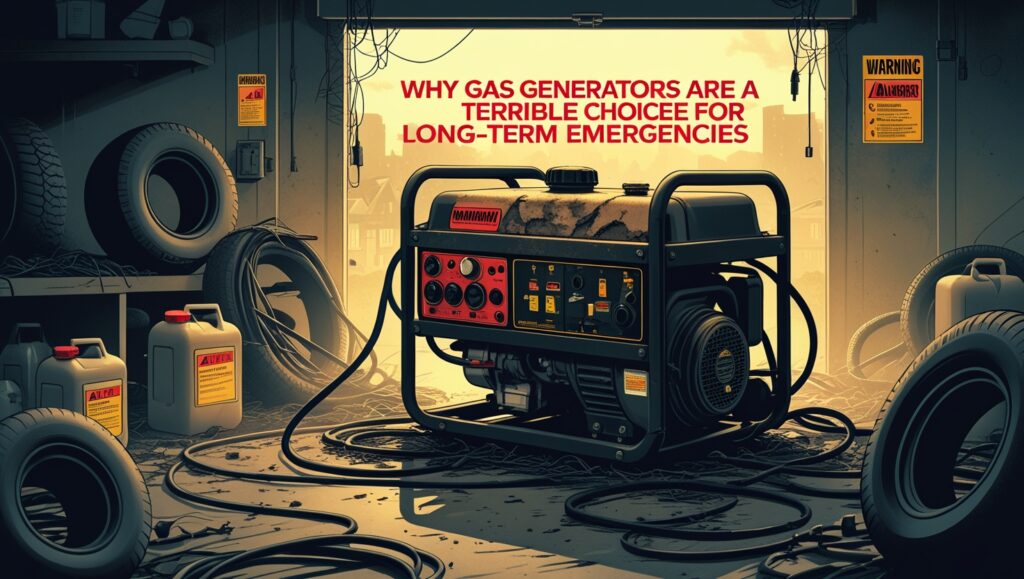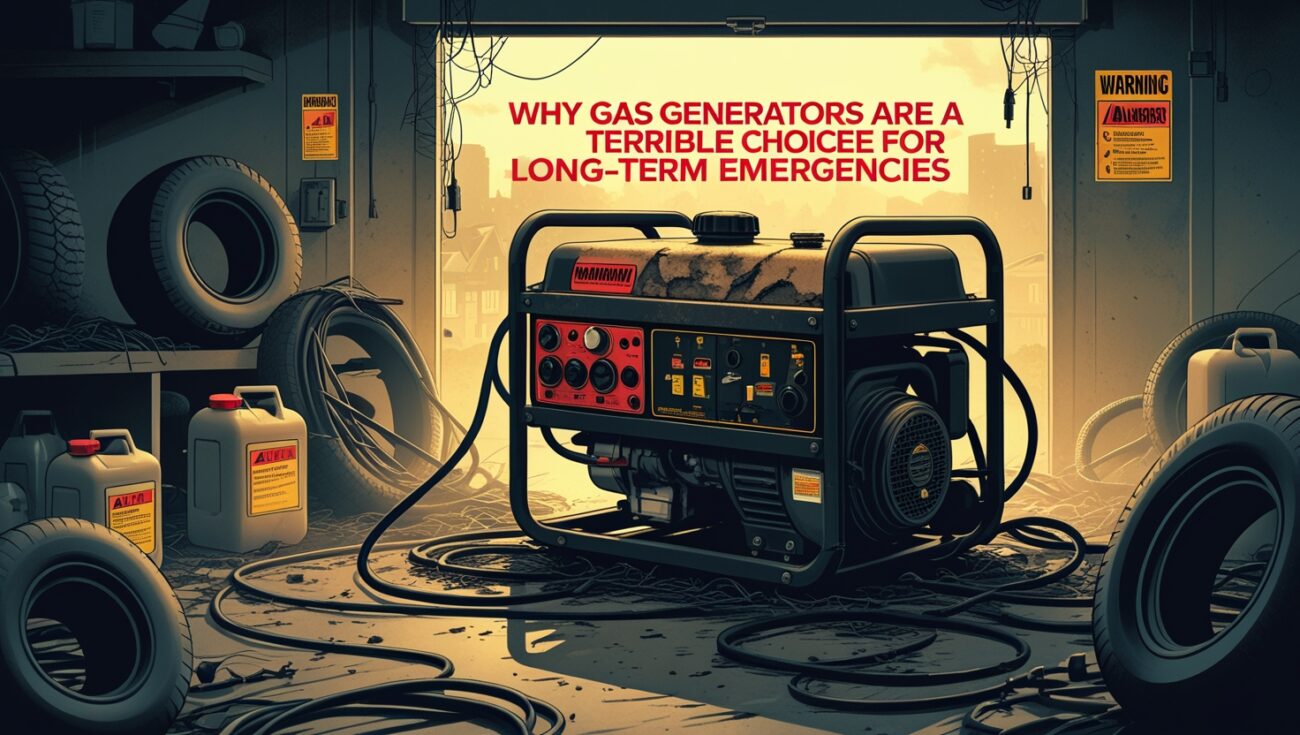Why Gas Generators Are a Terrible Choice for Long-Term Emergencies
I used to think gas generators were the answer to everything.
The power goes out? Fire up the generator. Need to keep the fridge running? Flip the switch. Easy… until I lived through a real emergency. That’s when I realized something most people don’t want to admit:
Gas generators are a terrible long-term solution.
If your emergency lasts longer than a day or two, you’ll run into problems fast. I learned the hard way—and now I use something much better: a low-tech backup power system that doesn’t rely on fuel, the sun, or the grid.
Here’s the power system I use now.
Let me explain why I’ll never depend on gas again—and what I use instead.

Table of Contents
Problem #1: Fuel Runs Out Fast
Most gas generators burn through a gallon every few hours. If the grid is down for days, you’ll need dozens of gallons to stay powered—and where are you going to get that during a blackout?
Gas stations need electricity to pump fuel. If they don’t have backup power, they’re out of service too. And in a real emergency, they’re the first places to run dry.
Problem #2: It Attracts the Wrong Attention
Generators are loud. Everyone hears it. If you’re the only house on the block with power, people will notice—and not always in a good way. In desperate times, that makes you a target.
I’ve had strangers knock on my door, asking questions. Others just watched from the sidewalk. Trust me—that kind of attention isn’t good when everyone’s in survival mode.
Problem #3: It’s a Carbon Monoxide Risk
Gas-powered generators cannot be used indoors, period. Every year, families die from carbon monoxide poisoning because they tried to use a generator in a garage or too close to their home.
One mistake and it could be fatal. That’s a huge liability—especially if you have kids or pets around.
Problem #4: Maintenance Is a Nightmare
If you haven’t used your generator in a few months, you might find:
- The battery is dead
- The carburetor is clogged
- The fuel is bad
- It won’t start at all
When you actually need it, you’re stuck doing last-minute repairs—or worse, it doesn’t work at all.
Problem #5: You Can’t Move It Easily
Most people buy generators that are bulky, heavy, and awkward to store. In a fast evacuation or natural disaster, you can’t just throw it in the car and go. It takes up space, needs separate gas containers, and it smells.
I needed something portable, lightweight, and easy to store. That’s why I started looking for a better solution.
What I Use Instead—and Why It Works
I found a low-tech, mechanical-based backup power system that doesn’t need fuel, doesn’t make noise, and doesn’t rely on the sun.
It’s quiet, portable, and cost me less than $300 to build.
It powers all my essentials:
- Lights
- Chargers
- Wi-Fi router
- Fan or heater
- Emergency gear
And it runs without gas, solar panels, or batteries.
No More Fuel Worries. No More Maintenance.
This new system sits quietly in my garage. It doesn’t need to be topped off, drained, or started every month. It’s reliable, repeatable, and best of all—it’s silent.
In a real crisis, that silence matters. You stay powered without tipping off the world around you.
Your Family Deserves a Safer Option
Gas generators have their place—for short outages, maybe. But if you’re serious about long-term preparedness, you need something more sustainable, something that doesn’t run out when things get tough.
This system gave me that. And honestly? It’s the smartest prepping move I’ve ever made.
Don’t Wait Until It’s Too Late
If you think gas will save you during a week-long emergency, think again. The shelves will be empty, the pumps won’t work, and the noise will draw unwanted attention.
You need something better—and now is the time to build it.
Click here to get the full guide.
This is how I power my home without fuel, solar, or noise—and why I’ll never go back to gas.
I Thought I Was Ready—Until the Generator Failed
When the power first went out, I felt confident. I wheeled out the gas generator I bought the year before and got it running. It worked—for a while. But by the second day, I was out of fuel, and the gas stations were already closed. I felt helpless. That’s when it hit me: I had no real backup.
Gas Generators Are a Short-Term Fix, Not a Long-Term Plan
The reality is, gas generators are made for temporary power outages—not ongoing disasters. Whether it’s a hurricane, blackout, cyberattack, or fuel shortage, once the initial tank runs dry, you’re done. They’re not sustainable beyond a couple of days.
They Cost More Than You Think
Most people don’t calculate the ongoing cost of fuel, maintenance, oil changes, and storage. I spent more on gas in one summer than I did building my new off-grid system. And when I think about that now, it’s frustrating. I wasted money on a system that failed me.
I Wanted Something Safer for My Family
Carbon monoxide wasn’t a small concern—it was terrifying. I kept checking the placement, opening windows, and second-guessing if it was safe. I have kids. I needed something that wouldn’t put them at risk. That’s why I turned to a low-tech power solution instead.
This is the system I use now, and I trust it fully.
This New System Doesn’t Make Me a Target
I sleep better knowing my home doesn’t draw attention. No loud engine. No fumes. No flashing lights. In an emergency, staying under the radar matters more than people realize. This off-grid setup keeps me powered and invisible. That’s worth everything.
It Was Surprisingly Easy to Build
I thought I’d need tools I didn’t own or skills I didn’t have. I was wrong. The guide broke everything down step-by-step. I followed it in my garage using tools I already had. No electrical background required. Just a willingness to take action.
I Built It for Less Than the Cost of Two Gas Refills
When I saw the price tag—under $300—I was skeptical. But after building it and using it during an actual outage, I was shocked. It ran everything I needed and cost way less than the “professional” generator setup I used to rely on.
This Power System Runs in Any Weather
No sun? No problem. No gas? Doesn’t matter. Snowstorm? Still works. This isn’t one of those flaky setups that only work under ideal conditions. It’s built for real-world emergencies, and it’s already saved me more than once.
Click here to get the low-tech backup system I now trust.
You Don’t Need to Be a “Prepper” to Be Smart
I never considered myself a survivalist. I’m just someone who wants to keep the lights on, my food cold, and my family safe. This system isn’t about going off-grid forever. It’s about being ready when the grid goes down—because it will.
I Wish I Had Known About This Sooner
If I could go back, I’d skip the gas generator entirely. It caused more stress than relief. This new system? It gave me calm. Confidence. Control. And it’s the first thing I tell my friends to build now.
Get the same power guide I used here.
This Isn’t a Luxury—It’s a Lifeline
We don’t prepare because we’re paranoid. We prepare because life happens. Storms hit. Blackouts last longer. And we don’t want to be left in the dark—literally or metaphorically. This system is a lifeline. It’s not optional anymore.
Build Something That Won’t Let You Down
Gas is loud, risky, short-lived, and dependent on a broken supply chain. Why would I ever trust it again?
I wouldn’t—and you don’t have to either.
Click here to get the low-tech backup system I now trust.
This changed how I protect my home. It might just do the same for you.

